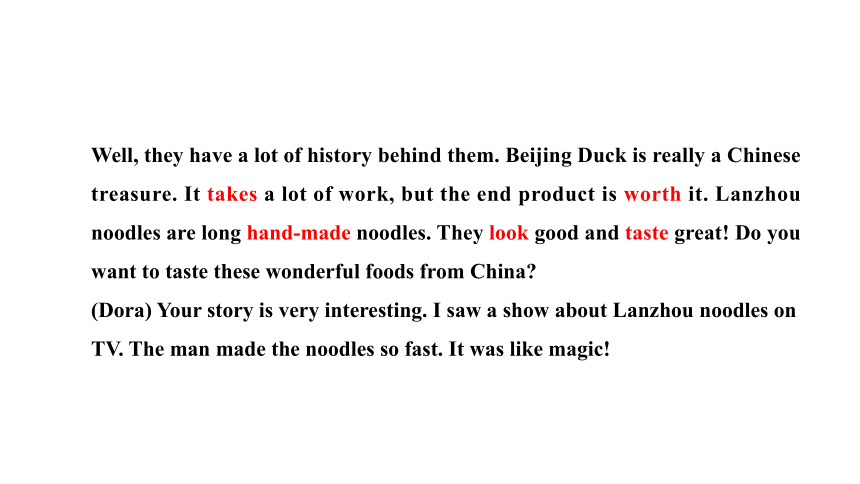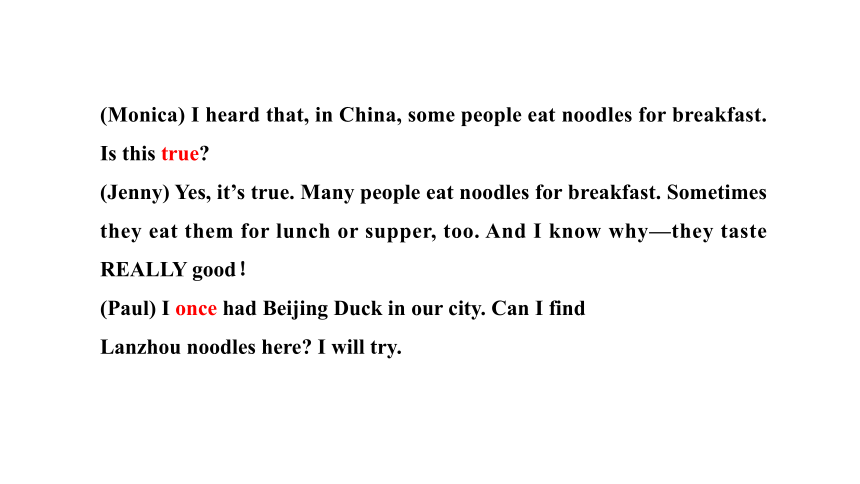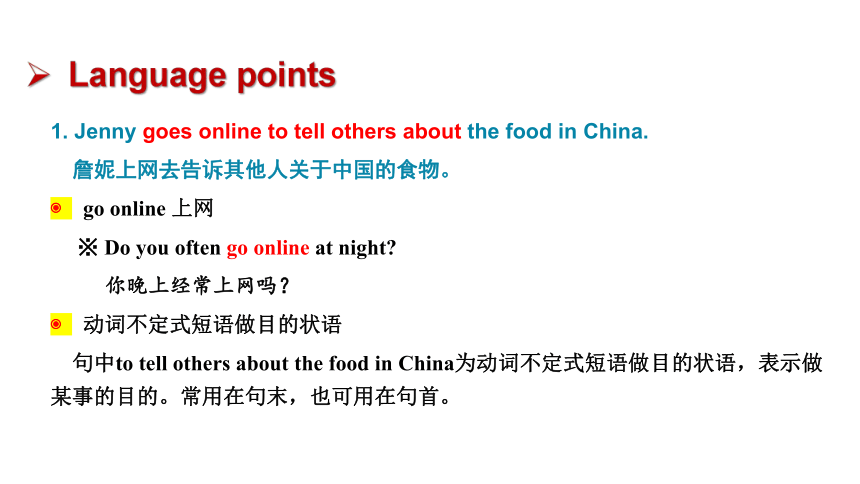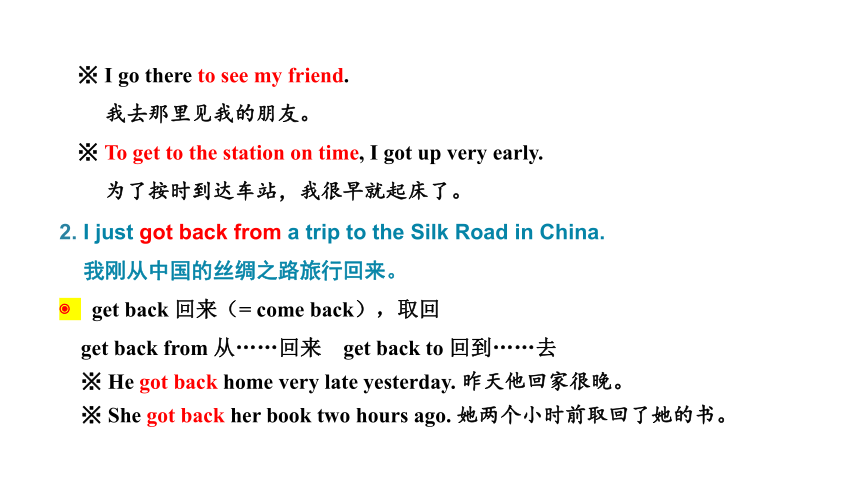冀教版七年级下册Unit 2 It's Show Time! Lesson 11 Food in China课件(共27张PPT)
文档属性
| 名称 | 冀教版七年级下册Unit 2 It's Show Time! Lesson 11 Food in China课件(共27张PPT) |

|
|
| 格式 | pptx | ||
| 文件大小 | 1016.4KB | ||
| 资源类型 | 教案 | ||
| 版本资源 | 冀教版 | ||
| 科目 | 英语 | ||
| 更新时间 | 2024-05-02 00:00:00 | ||
图片预览









文档简介
(共27张PPT)
Lesson 11: Food in China
Unit 2 It’s Show Time!
单词:online, especially, treasure, end, product, worse, taste,
true, once, hand-made, supper
短语:tell sb. about sth.
句型: They look good and taste great!
It takes a lot of work, but the end product is worth it.
掌握并运用关于食物的句型,了解中国特色美食及饮食文化。
Learning Goals
1
2
What’s your favourite food in China
Tell us something about your favourite food.
Presentation
(Jenny) Hello, everyone! I just got back from a trip to the Silk Road in China. Everything was great—especially the food! My favourite dishes were Beijing Duck and Lanzhou noodles. What’s so special about these two dishes
Jenny goes online to tell others about the food in China.
e-chatter
Well, they have a lot of history behind them. Beijing Duck is really a Chinese treasure. It takes a lot of work, but the end product is worth it. Lanzhou noodles are long hand made noodles. They look good and taste great! Do you want to taste these wonderful foods from China
(Dora) Your story is very interesting. I saw a show about Lanzhou noodles on TV. The man made the noodles so fast. It was like magic!
(Monica) I heard that, in China, some people eat noodles for breakfast. Is this true
(Jenny) Yes, it’s true. Many people eat noodles for breakfast. Sometimes they eat them for lunch or supper, too. And I know why—they taste REALLY good!
(Paul) I once had Beijing Duck in our city. Can I find
Lanzhou noodles here I will try.
Language points
1. Jenny goes online to tell others about the food in China.
詹妮上网去告诉其他人关于中国的食物。
go online 上网
※ Do you often go online at night
你晚上经常上网吗?
动词不定式短语做目的状语
句中to tell others about the food in China为动词不定式短语做目的状语,表示做某事的目的。常用在句末,也可用在句首。
※ I go there to see my friend.
我去那里见我的朋友。
※ To get to the station on time, I got up very early.
为了按时到达车站,我很早就起床了。
2. I just got back from a trip to the Silk Road in China.
我刚从中国的丝绸之路旅行回来。
get back 回来(= come back),取回
get back from 从……回来 get back to 回到……去
※ He got back home very late yesterday. 昨天他回家很晚。
※ She got back her book two hours ago. 她两个小时前取回了她的书。
back常见搭配
come back 回来
go back 回去
be back 回来
give back 归还
bring back 带回来
3. Everything was great — especially the food!
一切都很棒——尤其是食物!
especially 尤其; 特别地; 格外地
通常用于强调某事物, 或表示该事物比其他事物更值得一提或更重要。
※ I love music—especially traditional Chinese music.
我喜爱音乐——尤其是中国传统音乐。
4. It takes a lot of work, but the end product is worth it.
它花费大量的工序,但最后的成品是值得的。
take 花费,需要
It takes/took sb. some time to do sth. 某人花费一些时间来做某事
※ It took him three hours to finish the exercise. 他完成这些习题用了三个小时。
worth 值得(做某事); 有价值的
be worth + 名词/代词 值得……
be worth doing 值得做……
be worth + 钱 值……钱
※ The horse cost us 40,000 yuan, but it is not worth so much.
这匹马花了我们4万元, 但它不值那么多钱。
※ The Palace Museum is worth visiting.
故宫博物院值得一游。
※ Our house is worth 200,000.
我们的房子价值20万英镑。
5. Lanzhou noodles are long hand made noodles.
兰州拉面是手工的长面条。
hand-made 手工的
复合形容词
※ This model plane is hand-made.
这个飞机模型是手工制作的。
类似的形容词还有:
man-made 人造的 snow-covered 被雪覆盖的
6. They look good and taste great!
那他们看起来不错,而且尝起来也很美味!
look
作系动词,看起来
后面接形容词作表语
※ Your mother looks very young.
你妈妈看起来很年轻。
不及物动词,看
※ Look! The girl is looking at the blackboard.
看!这个女孩正看着黑板。
名词,看
have a look (at...) 看一看(……)
※ Have a look at the photo! 看一看这张照片!
look
作系动词,有……的味道
※ The food tastes very delicious.
这种食物尝起来很可口。
动词,品尝
※ Please taste the food. 请尝尝这种食物。
名词,味道
※ It has a sweet taste. 它有一股甜味。
7. Is this true 这是真的吗?
true 真实的,真正的,正确的
※ We’re true friends.
我们是真正的朋友。
辨析true和real
true “真正的,真实的”,强调事实和实际情况相符,与“假的”相对,true还可以表示“正确的”。 The news is true.
这个消息是真的。(不是假消息)
real 指客观上存在,并非想象和虚构的,与“虚构的”相对 Lu Xun’s real name is Zhou Shuren.
鲁迅的真名是周树人。
8. I once had Beijing Duck in our city.
我曾经在我们的城市里吃过北京烤鸭。
once 从前,一度,一次
※ He was once rich.
他一度富有过。
※ —How often do you write to your pen pal
你多长时间给你的笔友写一次信?
—Once a month.
一月一次。
once 的常见搭配:
at once 立刻,马上
more than once 不止一次
once again 再一次
1. Listen and write true (T) or false (F).
Let’s do it!
1. Beijing Duck takes a lot of work to make. ( )
2. Some people eat noodles for breakfast in China. ( )
3. Paul once had Beijing Duck in his city. ( )
T
T
T
2. Each word below has two different meanings beside it. Both
meanings are correct but only one meaning is used in this lesson.
Tick the appropriate meaning.
1. dishes □special kinds of meals or food □plates and bowls
2. treasure □something very expensive □something very special
3. taste □to eat a little bit of food □the flavour of food
4. product □goods for selling □result from working
√
√
√
√
3. Read the lesson and fill in the blanks.
Jenny just got back from a trip to the Silk Road. She goes online to tell others about the food in China. Her favourite ________ were Beijing Duck and Lanzhou noodles. They have a lot of ________ behind them. Beijing Duck is a true Chinese ________. Lanzhou noodles are hand made noodles. They ________ delicious.
dishes
history
treasure
taste
4. Rewrite the sentences below in the simple past tense.
Then mark the regular verbs with ( ) and the irregular verbs with ( )
1. The food looks good. → The food looked good.
2. He eats cereal for breakfast. →
3. They work hard. →
4. She finds many books in the library. →
5. It takes a long time to make dumplings.→
He ate cereal for breakfast.
They worked hard.
She found many books in the library.
It took a long time to make dumplings.
5. Work in pairs. Talk about different dishes you know. What’s
your favourite dish What’s in it Is it easy to make
Example:
Poutine is a Canadian dish.
Poutine is made with French fries, cheese and gravy.
It’s easy to make and it’s delicious!
Hot pot is a traditional Chinese dish.
There are eggs, fork, meat, leaf vegetables, mushrooms, dumplings, tofu, and seafood
in it. It's not easy to make...
Practice
单项选择
1. You can tell me something ________ your family.
A. over B. above
C. about D. to
2. — Dinner is ready. Help yourself!
— Wow! It ________ delicious. You are really good at cooking.
A. looks B. sounds
C. tastes D. feels
√
√
3. — The cheese doesn’t ________ good. Why don’t we go to buy some fresh
cheese
— Sounds great!
A. see B. find
C. sound D. taste
√
Homework
1. Remember the new words and expressions
learnt in this lesson.
2. Preview Lesson 12.
Lesson 11: Food in China
Unit 2 It’s Show Time!
单词:online, especially, treasure, end, product, worse, taste,
true, once, hand-made, supper
短语:tell sb. about sth.
句型: They look good and taste great!
It takes a lot of work, but the end product is worth it.
掌握并运用关于食物的句型,了解中国特色美食及饮食文化。
Learning Goals
1
2
What’s your favourite food in China
Tell us something about your favourite food.
Presentation
(Jenny) Hello, everyone! I just got back from a trip to the Silk Road in China. Everything was great—especially the food! My favourite dishes were Beijing Duck and Lanzhou noodles. What’s so special about these two dishes
Jenny goes online to tell others about the food in China.
e-chatter
Well, they have a lot of history behind them. Beijing Duck is really a Chinese treasure. It takes a lot of work, but the end product is worth it. Lanzhou noodles are long hand made noodles. They look good and taste great! Do you want to taste these wonderful foods from China
(Dora) Your story is very interesting. I saw a show about Lanzhou noodles on TV. The man made the noodles so fast. It was like magic!
(Monica) I heard that, in China, some people eat noodles for breakfast. Is this true
(Jenny) Yes, it’s true. Many people eat noodles for breakfast. Sometimes they eat them for lunch or supper, too. And I know why—they taste REALLY good!
(Paul) I once had Beijing Duck in our city. Can I find
Lanzhou noodles here I will try.
Language points
1. Jenny goes online to tell others about the food in China.
詹妮上网去告诉其他人关于中国的食物。
go online 上网
※ Do you often go online at night
你晚上经常上网吗?
动词不定式短语做目的状语
句中to tell others about the food in China为动词不定式短语做目的状语,表示做某事的目的。常用在句末,也可用在句首。
※ I go there to see my friend.
我去那里见我的朋友。
※ To get to the station on time, I got up very early.
为了按时到达车站,我很早就起床了。
2. I just got back from a trip to the Silk Road in China.
我刚从中国的丝绸之路旅行回来。
get back 回来(= come back),取回
get back from 从……回来 get back to 回到……去
※ He got back home very late yesterday. 昨天他回家很晚。
※ She got back her book two hours ago. 她两个小时前取回了她的书。
back常见搭配
come back 回来
go back 回去
be back 回来
give back 归还
bring back 带回来
3. Everything was great — especially the food!
一切都很棒——尤其是食物!
especially 尤其; 特别地; 格外地
通常用于强调某事物, 或表示该事物比其他事物更值得一提或更重要。
※ I love music—especially traditional Chinese music.
我喜爱音乐——尤其是中国传统音乐。
4. It takes a lot of work, but the end product is worth it.
它花费大量的工序,但最后的成品是值得的。
take 花费,需要
It takes/took sb. some time to do sth. 某人花费一些时间来做某事
※ It took him three hours to finish the exercise. 他完成这些习题用了三个小时。
worth 值得(做某事); 有价值的
be worth + 名词/代词 值得……
be worth doing 值得做……
be worth + 钱 值……钱
※ The horse cost us 40,000 yuan, but it is not worth so much.
这匹马花了我们4万元, 但它不值那么多钱。
※ The Palace Museum is worth visiting.
故宫博物院值得一游。
※ Our house is worth 200,000.
我们的房子价值20万英镑。
5. Lanzhou noodles are long hand made noodles.
兰州拉面是手工的长面条。
hand-made 手工的
复合形容词
※ This model plane is hand-made.
这个飞机模型是手工制作的。
类似的形容词还有:
man-made 人造的 snow-covered 被雪覆盖的
6. They look good and taste great!
那他们看起来不错,而且尝起来也很美味!
look
作系动词,看起来
后面接形容词作表语
※ Your mother looks very young.
你妈妈看起来很年轻。
不及物动词,看
※ Look! The girl is looking at the blackboard.
看!这个女孩正看着黑板。
名词,看
have a look (at...) 看一看(……)
※ Have a look at the photo! 看一看这张照片!
look
作系动词,有……的味道
※ The food tastes very delicious.
这种食物尝起来很可口。
动词,品尝
※ Please taste the food. 请尝尝这种食物。
名词,味道
※ It has a sweet taste. 它有一股甜味。
7. Is this true 这是真的吗?
true 真实的,真正的,正确的
※ We’re true friends.
我们是真正的朋友。
辨析true和real
true “真正的,真实的”,强调事实和实际情况相符,与“假的”相对,true还可以表示“正确的”。 The news is true.
这个消息是真的。(不是假消息)
real 指客观上存在,并非想象和虚构的,与“虚构的”相对 Lu Xun’s real name is Zhou Shuren.
鲁迅的真名是周树人。
8. I once had Beijing Duck in our city.
我曾经在我们的城市里吃过北京烤鸭。
once 从前,一度,一次
※ He was once rich.
他一度富有过。
※ —How often do you write to your pen pal
你多长时间给你的笔友写一次信?
—Once a month.
一月一次。
once 的常见搭配:
at once 立刻,马上
more than once 不止一次
once again 再一次
1. Listen and write true (T) or false (F).
Let’s do it!
1. Beijing Duck takes a lot of work to make. ( )
2. Some people eat noodles for breakfast in China. ( )
3. Paul once had Beijing Duck in his city. ( )
T
T
T
2. Each word below has two different meanings beside it. Both
meanings are correct but only one meaning is used in this lesson.
Tick the appropriate meaning.
1. dishes □special kinds of meals or food □plates and bowls
2. treasure □something very expensive □something very special
3. taste □to eat a little bit of food □the flavour of food
4. product □goods for selling □result from working
√
√
√
√
3. Read the lesson and fill in the blanks.
Jenny just got back from a trip to the Silk Road. She goes online to tell others about the food in China. Her favourite ________ were Beijing Duck and Lanzhou noodles. They have a lot of ________ behind them. Beijing Duck is a true Chinese ________. Lanzhou noodles are hand made noodles. They ________ delicious.
dishes
history
treasure
taste
4. Rewrite the sentences below in the simple past tense.
Then mark the regular verbs with ( ) and the irregular verbs with ( )
1. The food looks good. → The food looked good.
2. He eats cereal for breakfast. →
3. They work hard. →
4. She finds many books in the library. →
5. It takes a long time to make dumplings.→
He ate cereal for breakfast.
They worked hard.
She found many books in the library.
It took a long time to make dumplings.
5. Work in pairs. Talk about different dishes you know. What’s
your favourite dish What’s in it Is it easy to make
Example:
Poutine is a Canadian dish.
Poutine is made with French fries, cheese and gravy.
It’s easy to make and it’s delicious!
Hot pot is a traditional Chinese dish.
There are eggs, fork, meat, leaf vegetables, mushrooms, dumplings, tofu, and seafood
in it. It's not easy to make...
Practice
单项选择
1. You can tell me something ________ your family.
A. over B. above
C. about D. to
2. — Dinner is ready. Help yourself!
— Wow! It ________ delicious. You are really good at cooking.
A. looks B. sounds
C. tastes D. feels
√
√
3. — The cheese doesn’t ________ good. Why don’t we go to buy some fresh
cheese
— Sounds great!
A. see B. find
C. sound D. taste
√
Homework
1. Remember the new words and expressions
learnt in this lesson.
2. Preview Lesson 12.
同课章节目录
- Unit 1 A Trip to the Silk Road
- Lesson 1 A Trip to China
- Lesson 2 Meet You in Beijing
- Lesson 3 A Visit to Xi'an
- Lesson 4 A Visit to Lanzhou
- Lesson 5 Another Stop along the Silk Road
- Lesson 6 Jenny's Diary
- Unit 2 It's Show Time!
- Lesson 7 What's Your Project about?
- Lesson 8 Marco Polo and the Silk Road
- Lesson 9 Danny's School Project
- Lesson 10 Music and Dance
- Lesson 11 Food in China
- Lesson 12 A Blog about the Silk Road
- Unit 3 School Life
- Lesson 13 How Is School Going?
- Lesson 14 Jenny's School Life
- Lesson 15 Making a Difference
- Lesson 16 We Are with You!
- Lesson 17 School Science Fai
- Lesson 18 Teaching in China
- Unit 4 After-School Activities
- Lesson 19 A Dinner Date
- Lesson 20 Join Our Club!
- Lesson 21 What Is Your Club Type?
- Lesson 22 Big Plans for the Weekend
- Lesson 23 A Weekend with Grandma
- Lesson 24 How was Your Weekend?
- Unit 5 I Love Learning English!
- Lesson 25 A Phone Friend
- Lesson 26 Online Phone Calls
- Lesson 27 Amazing English
- Lesson 28 How Do I Learn English?
- Lesson 29 A Door to the World
- Lesson 30 Writing an E-mail in English
- Unit 6 Seasons
- Lesson 31 What Strange Weather!
- Lesson 32 I Can't Wait for Winter!
- Lesson 33 Kim's Favourite Season
- Lesson 34 Steven's Report
- Lesson 35 Surfing in Sydney
- Lesson 36 Spring in China
- Unit 7 Sports and Good Health
- Lesson 37 You Are What You Eat!
- Lesson 38 Stay Healthy!
- Lesson 39 Danny's Report
- Lesson 40 Move Your Body
- Lesson 41 Were People Healthy Then?
- Lesson 42 Know Yourself
- Unit 8 Summer Holiday Is Coming!
- Lesson 43 Have a Good Summer!
- Lesson 44 Volunteering in Summe
- Lesson 45 Baseball Season
- Lesson 46 Get Ready for Summer Holiday!
- Lesson 47 Summer Plans
- Lesson 48 Li Ming's Summer Holiday
